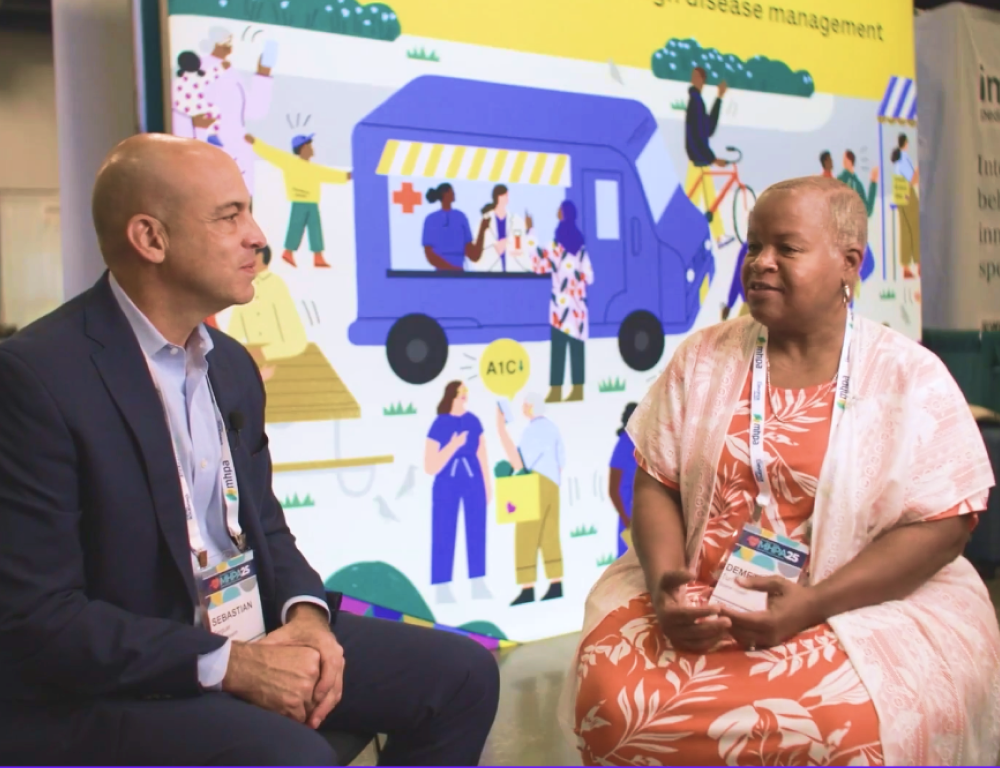
I love helping patients feel like they have someone who is on their side when they are trying to navigate multiple systems that are not always in their favor. — Amrita Deol, Scene Health Coach
When a patient takes medication in a hospital or clinical setting, they’re surrounded by support. Someone brings them their medicine and watches them take it (or shows the patient how to self-administer it). Every dose, every day. This is Directly Observed Therapy (DOT), and it’s the gold standard for ensuring medication adherence.
But when the patient goes home, they lose this support, and adherence can go off track for any number of reasons. It’s estimated that medication nonadherence leads to more than 100,000 unnecessary deaths and costs the U.S. healthcare system more than $500 billion annually.
We’re changing that. By combining enhanced DOT, personalized video coaching, education, and motivational content, we make it fun for members to stay on top of their medications, improving health outcomes and quality metrics fast — often in less than 90 days.
The magic happens at each point of contact, person to person, through our care team.
It’s about making connections
“I get the most satisfaction from seeing how patients trust me and the process we put in place for them,” says Hillary Williams, our Care Team Lead. “They enjoy the videos and interactions we have with them. They feel encouraged and supported.”
That kind of personal connection is an oft-repeated theme from many of our care team members. Health Coach Keyerra Anderson adds, “I absolutely love anytime I get to talk to my patients. Like for their monthly check-in call to ensure they’re not having any medication issues. They are always so sweet!”
“For me, it’s their gratitude and appreciation for what we do; the joy my videos bring them; the feeling that I’m actually helping them get through tough times,” comments Health Coach Chrystal Webb.
And because many patients with chronic conditions who struggle with adherence are elderly, Nurse Liz Bibart, RN, finds, “Some have few family or friends to communicate with, or who show an interest in their well-being. So we become like family and a bright spot in their day.”
It’s about getting patients engaged
Each patient comes with their own unique set of factors that can impact their ability to maintain medication adherence. An individual’s age, personality, home environment, medical condition and needs, financial situation, native language, tech savviness and access, literacy level, and so many other factors combine to create the personal landscape our care team must navigate to get patients not only to accept but embrace their personalized adherence program.
To add, patients may approach the program with nervousness, skepticism, confusion, or concern. To help them get comfortable, our care team members lean on their backgrounds and experience.“I’ve spent a bit of time in their shoes myself, so it’s helpful understanding what they’re going through at these doctor appointments, and with family, and with all the uncertainty about what happens next,” says Hillary.
A former teacher with the Peace Corps, Keyerra, adds that “social work has taught me the importance of meeting people where they are. I approach my patients with empathy and let them know their concerns are totally valid.” Nurse Ashleigh Zimmerman says she relies on her medical/surgery and case management experiences and her motivational interviewing skills to help patients embrace change.
Likewise, Chrystal cites her experience working closely with physical therapy patients in rehab and her customer service skills, which allow her to talk confidently to patients about the importance of having care team support. And Health Coach Amrita Deol points to her extensive experience with underserved and immigrant populations, which help her “understand the importance of patience, empathy, and explaining things fully.”
For Liz, “Presenting the program in a ‘no pressure’ light is key. I try to be transparent about the program and our expectations, and if a patient still seems resistant, I may ask them to give it a try for a few days and then decide.”
It’s about change
Every patient is different, but our care team’s efforts and the personal connections they make quite often lead to rapid and eye-opening results in engagement, adherence, and health outcomes.
According to Keyerra, “Patients become really comfortable with our care team. In the chat or in the patients’ videos, it’s really cool to see mentions of our shared interests, such as music. The patients are so happy to hear from us.” As the program progresses, Ashleigh says that “the skepticism disappears and rapport increases between the patient and us.”
The natural result of that increased comfort level and personal connections can be extraordinary. “Patients began talking to us in their videos,” says Hillary. “They trust us with info about their families, other health issues, goals, and everything in between. Patients have even taken the phone around and introduced their families to us. It’s great when that happens!”
Of course, the most important results are seen in their patients’ improved approach to their health and their positive health outcomes. “The best feeling ever is seeing our pediatric asthma patients’ progress,” says Liz. “Going from poor and ineffective technique with their inhalers to a great technique and overall improvement in their symptoms. Other patients begin the program with an elevated A1C, and through the program, they develop a good routine with their medication adherence and see a significant improvement in A1C! That is a big deal.”
It’s about more than just reminding someone to take a pill
Because our care team often develops close relationships with those they serve, they have a unique window into the lives of their patients. Our care team members often become privy to — and can help patients deal with — a variety of challenges that can affect their adherence or their general health. As Amrita puts it, “Patients feel more comfortable opening up about their lives and the things they’re dealing with — they feel that we’re a safe space.”
Keyerra adds, “Working with my patients has certainly reinforced to me the fact that socioeconomic factors can affect health. For example, my patients who live in food deserts may not have access to healthy food options. Others may not be taking their medication consistently because they don’t have transportation to get to the pharmacy or to their doctor.”
Through their interactions with patients in their home environments, care team members see a wide range of obstacles to adherence that patients are reluctant to share with their medical providers. Some are determined by social factors (social determinants of health, or SDOH), and some are behavioral in nature. “For example,” Hillary explains, “The amount of sugar they eat and drink. Some patients smoke. Some are intimidated by doctors and nurses.” Other care team members cite other patient issues like depression, feeling overwhelmed, complex financial situations, home life challenges, insurance struggles, and more.
Our care team members are trained and able to help patients deal with these kinds of adherence challenges, first by listening, and then by helping patients connect with the resources available to them. Amrita offers some examples. “I’ve helped patients get their medications and supplies to manage their diabetes when they couldn’t afford it. I’ve encouraged patients to change doctors if they’re unhappy with their care in a way that affects their health and ability to get or take their meds. If they have transportation issues, I’ve helped patients find pharmacies that are closer to where they live or can deliver. I helped a patient who was on vacation figure out how to transfer her prescription, so she didn’t miss doses. I’ve provided patients who are struggling with issues like depression, anxiety, and PTSD with continuous positive support when they can’t give that to themselves.”
It's a personal thing
Modern medicine, healthcare, and the healthcare system are all complex, so our care team members rely on their expertise to help patients understand and participate in their treatment. Yet, it’s their warmth that makes our care team so successful at improving medication adherence. When looking for new care team members, “We look for people who are empathetic, upbeat, genuine, honest, encouraging (while giving a little push), organized, a self-starting team player, trustworthy, confident, funny (because we all need to laugh), responsible, loyal, able to take constructive criticism, hard-working, and personable. And I’m sure I’ve forgotten some!” says Hillary.
And that warmth shines through. Our care team members overwhelmingly talk about their work in human (rather than clinical) terms. Keyerra recalls that many of the patients she engages with “will talk about anything with me, like jobs and families. One patient always ends our calls by saying, ‘Go Ravens’ — and I’m a big football fan myself."
Comments from Chrystal and Amrita display up the warmth of the care team experience nicely.
“I am an educator, motivator, and listener for my patients,” explains Chrystal. “Essentially a new ‘friend’ who has their back. They appreciate what we’re doing and that it’s making a difference in their lives.” Similarly, Amrita says, “I’m a source of support and someone they can lean on or ask for help. I think they see me as a friend, a family member, and someone who cares for them.”






.jpg)

.png)
